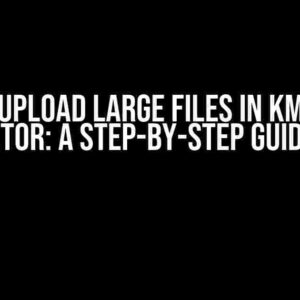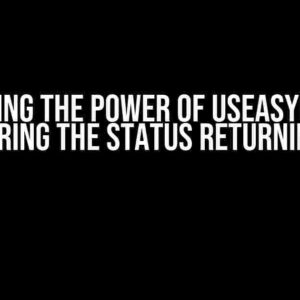Have you ever found yourself in a situation where you’re staring at your localhost, wondering where on earth your cookie has gone? You’re not alone! In this article, we’ll delve into the most common reasons behind the disappearance of cookies on localhost and provide you with a comprehensive guide to troubleshoot and resolve the issue.
The Anatomy of a Cookie
Before we dive into the troubleshooting process, let’s take a brief look at how cookies work. A cookie is a small piece of data stored on a user’s device by a web browser. It’s used to store information such as preferences, login credentials, and other settings. Cookies are typically set by a web server using the Set-Cookie header in an HTTP response.
HTTP/1.1 200 OK Content-Type: text/html; charset=UTF-8 Set-Cookie: cookie_name=cookie_value; expires=Wed, 21-Jan-2026 01:23:45 GMT; path=/; secure
Reason 1: Incorrect Cookie Domain or Path
One of the most common reasons behind missing cookies on localhost is an incorrect cookie domain or path. When setting a cookie, you need to ensure that the domain and path match the current URL.
For example, if your localhost URL is http://localhost:3000, and you’re setting a cookie with the domain example.com, the cookie won’t be accessible on localhost.
To fix this, make sure to set the correct domain and path when setting the cookie:
Set-Cookie: cookie_name=cookie_value; expires=Wed, 21-Jan-2026 01:23:45 GMT; path=/; domain=localhost
Reason 2: Cookie Expiration or Deletion
An expired or deleted cookie can cause it to disappear on localhost. Check the expiration date of the cookie and ensure it’s not expired. If the cookie has expired, you can simply set a new one with an updated expiration date.
In Chrome, you can access the cookie expiration date by following these steps:
- Open Chrome and navigate to your localhost URL
- Press F12 to open the Developer Tools
- In the Developer Tools, switch to the Application tab
- In the Application tab, navigate to the Cookies section
- Find the cookie you’re looking for and check the Expiration column
Reason 3: Same-Origin Policy
The Same-Origin Policy is a security restriction implemented in web browsers to prevent malicious scripts from accessing sensitive data. If your localhost URL has a different origin than the URL that set the cookie, the cookie won’t be accessible due to the Same-Origin Policy.
To bypass this restriction, you can use the localhost domain or use a proxy server to set the cookie.
Reason 4: Cookie Size Limitations
Cookies have size limitations, and if the cookie exceeds the maximum size, it may not be set correctly. The maximum size of a cookie varies between browsers, but a general guideline is to keep cookies under 4KB.
To check the cookie size, you can use the following code:
console.log(document.cookie.length);
If the cookie size exceeds the maximum limit, consider splitting the data into multiple cookies or using a different storage mechanism, such as LocalStorage or SessionStorage.
Reason 5: Browser Extensions or Add-Ons
Sometimes, browser extensions or add-ons can interfere with cookie functionality. Try disabling all extensions and add-ons and then check if the cookie is present.
Reason 6: Server-Side Issues
HTTP/1.1 200 OK Content-Type: text/html; charset=UTF-8 Set-Cookie: cookie_name=cookie_value; expires=Wed, 21-Jan-2026 01:23:45 GMT; path=/; secure
Troubleshooting Steps
Follow these steps to troubleshoot the issue:
- Check the browser console for any errors or warnings related to cookies
- Verify that the cookie is being set correctly on the server-side
- Check the cookie expiration date and ensure it’s not expired
- Verify that the cookie domain and path match the current URL
- Check the cookie size and ensure it’s within the maximum limit
- Disable all browser extensions and add-ons and check if the cookie is present
- Try accessing the cookie using the
document.cookieproperty in the browser console
Conclusion
The mysterious case of the missing cookie on localhost can be solved by following the steps outlined in this article. Remember to check for incorrect cookie domains or paths, expiration or deletion, Same-Origin Policy restrictions, cookie size limitations, browser extensions or add-ons, and server-side issues. By following these troubleshooting steps, you’ll be able to identify and resolve the issue, and your cookie will reappear on localhost.
| Reason | Solution |
|---|---|
| Incorrect Cookie Domain or Path | Set the correct domain and path when setting the cookie |
| Cookie Expiration or Deletion | Check the expiration date and set a new cookie with an updated expiration date |
| Same-Origin Policy | Use the localhost domain or a proxy server to set the cookie |
| Cookie Size Limitations | Split the data into multiple cookies or use a different storage mechanism |
| Browser Extensions or Add-Ons | Disable all extensions and add-ons and check if the cookie is present |
| Server-Side Issues | Verify that the cookie is being set correctly on the server-side |
FAQs
- Q: Why can’t I access my cookie on localhost?
A: Check the cookie domain and path, expiration date, and browser console for any errors or warnings.
- Q: How do I set a cookie on localhost?
A: Use the
Set-Cookieheader in an HTTP response to set a cookie. - Q: What is the maximum size of a cookie?
A: The maximum size of a cookie varies between browsers, but a general guideline is to keep cookies under 4KB.
By following the instructions and explanations outlined in this article, you should be able to resolve the issue of the missing cookie on localhost. Remember to be patient and methodical in your troubleshooting approach, and don’t hesitate to reach out if you have any further questions or concerns. Happy coding!Here are 5 questions and answers about “plz let me know why my cookie is missing on localhost” in a creative voice and tone:
Frequently Asked Question
Have you ever wondered what happened to your beloved cookie on localhost? We’ve got the answers!
Q1: Did I accidentally delete the cookie?
Nope! Unless you’re a cookie ninja, it’s unlikely you deleted it without realizing. Check your browser’s developer tools to see if the cookie is still present.
Q2: Is my localhost not setting cookies properly?
Maybe! Make sure your localhost is configured to set cookies correctly. Check your server settings and ensure that the cookie domain is set to “localhost” or the correct domain.
Q3: Did my browser clear the cookie?
Possibly! If you’ve been testing and re-testing, your browser might have cleared the cookie. Try closing and reopening your browser or checking the browser’s privacy settings.
Q4: Is there a cookie conflict?
Could be! If you have multiple applications or tests running, they might be overwriting or conflicting with each other’s cookies. Try isolating the test or application to see if the issue persists.
Q5: Should I try debugging the cookie?
Absolutely! Use your browser’s developer tools to debug the cookie. Check the cookies section in the dev tools to see if the cookie is being set correctly and if there are any errors.






